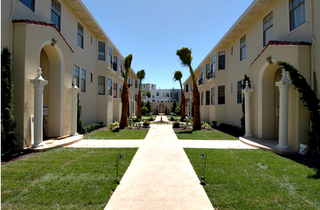Great Groups, Part 1
Today if you go to a TIC open house one of the first things you might hear is "We've got wonderful partners lined up. Smart people, nice people. It's a going to be a great group!" Keep in mind the selling agents who are promoting the fine qualities of your fellow buyers will soon be gone and in the end it is going to be you and the other new owners alone in your living rooms, poring over spreadsheets and contracters' estimates, trying to figure out the dynamics of your day-to-day relationships and how much to pay for the new roof.
My TIC group came together more by accident than by design, but it actually has turned out to be "a great group." Here are some of the reasons why:
1. We were business partners before we became friends.
(None of us knew each other before entering the TIC. There are no personal alliances encouraging cliques to form or
clouding our judgements about what is best for the building.)
2. We have a diversity of professional expertise among the partners.
(A civil engineer, a lawyer, a graphic designer, a deaf sign language interpreter, a database coordinator and a public health manager.)
3. We all love old historical buildings.
(If you are buying into an old building like our 1910 Edwardian, the love factor helps mitigate the inevitable bother of dealing with contractors and maintenance surprises like pieces of plaster falling off that lovely decorative facade.)
4. We all started out in the same income bracket.
(Because no one owner has significantly more money that the others, no one presses for renovations and upgrades the rest of us cannot afford. We also do not have owners who are retired or living on fixed incomes redlighting repairs the rest of us feel are necessary.)
5. We are all about the same age.
(As boomers we share the same general cultural framework and some of the same concerns that come from being middle-aged.)
6. We are all open and effective communicators.
(We focus on solving problems and listen to all divergent points of view before making a decision.)
7. None of us has any kids.
(There's nothing wrong with kids. But for us it seems to help that there is no opportunity for differing opinions between those that do and those that don't.)
8. None of us has a tendency to blame other people for our own failings, issues, or misfortunes.
(This may have something to do with the fact that at age 40+ we have all learned that the blame game never fixes or changes anything.)
9. We are all comfortable with collaboration.
(No one in our group feels driven to be "the leader.")
10. We always have food and wine (lots of wine) at our meetings.
(After taking care of business our meetings more or less turn into a party.)
I am sure the formulas vary for every successful TIC.
My TIC group came together more by accident than by design, but it actually has turned out to be "a great group." Here are some of the reasons why:
1. We were business partners before we became friends.
(None of us knew each other before entering the TIC. There are no personal alliances encouraging cliques to form or
clouding our judgements about what is best for the building.)
2. We have a diversity of professional expertise among the partners.
(A civil engineer, a lawyer, a graphic designer, a deaf sign language interpreter, a database coordinator and a public health manager.)
3. We all love old historical buildings.
(If you are buying into an old building like our 1910 Edwardian, the love factor helps mitigate the inevitable bother of dealing with contractors and maintenance surprises like pieces of plaster falling off that lovely decorative facade.)
4. We all started out in the same income bracket.
(Because no one owner has significantly more money that the others, no one presses for renovations and upgrades the rest of us cannot afford. We also do not have owners who are retired or living on fixed incomes redlighting repairs the rest of us feel are necessary.)
5. We are all about the same age.
(As boomers we share the same general cultural framework and some of the same concerns that come from being middle-aged.)
6. We are all open and effective communicators.
(We focus on solving problems and listen to all divergent points of view before making a decision.)
7. None of us has any kids.
(There's nothing wrong with kids. But for us it seems to help that there is no opportunity for differing opinions between those that do and those that don't.)
8. None of us has a tendency to blame other people for our own failings, issues, or misfortunes.
(This may have something to do with the fact that at age 40+ we have all learned that the blame game never fixes or changes anything.)
9. We are all comfortable with collaboration.
(No one in our group feels driven to be "the leader.")
10. We always have food and wine (lots of wine) at our meetings.
(After taking care of business our meetings more or less turn into a party.)
I am sure the formulas vary for every successful TIC.


